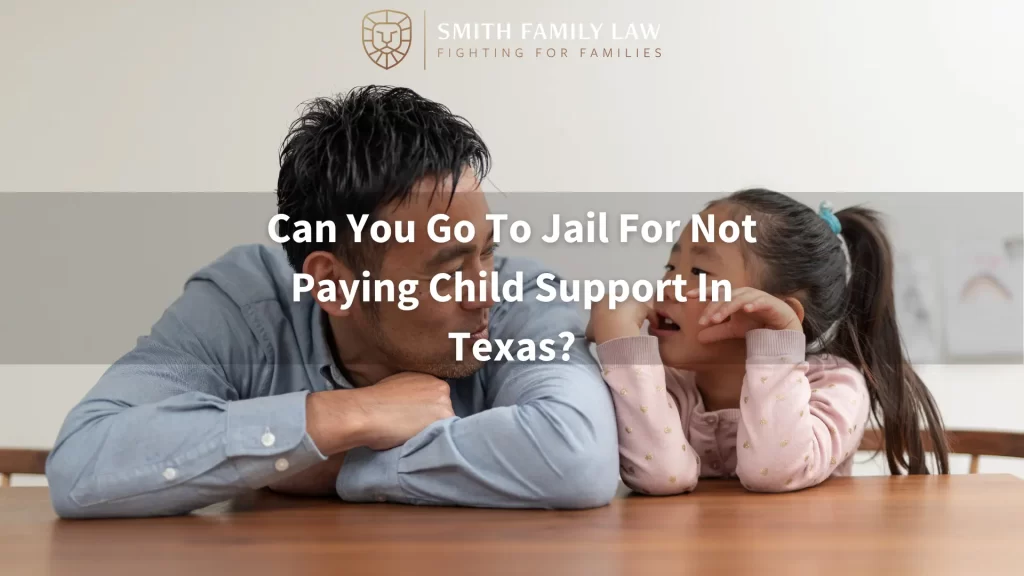
Yes, failure to pay child support in Texas could result in jail time of up to two years, depending on the situation.
Child support is common in many Texas divorce and child custody cases. The noncustodial parent makes child support payments to the custodial parent. It’s assessed on a sliding scale, depending on the paying parent’s income and the number of children they must support. There are also options for low-income child support, in which the percentage of the paying parent’s income is lower than the state standard.
An order to pay child support in Texas is a court order with the same legal status as any other court order. If you fail to pay court-ordered child support, you may face contempt of court charges. The penalty for contempt of court is up to six months in jail, and this isn’t the only consequence of not paying child support in Texas.
Is Child Support Mandatory?
Child support isn’t automatic in every divorce or child custody case, such as situations where parents split custody and expenses equally. It may be specified in a divorce decree or mandated by a Texas court. Once child support is ordered, though, it is mandatory. If you withhold child support from the child’s other parent, then you could face serious legal and financial consequences.
What Happens If You Don’t Pay Child Support?
The Texas Office of the Attorney General (OAG) has a program to identify individuals who owe back child support. The Child Support Evader Program publishes the names and photos of parents who have not paid child support in the past six months or whose delinquency has reached more than $5,000. The OAG encourages Texas residents to contact the program with tips to find these individuals, similar to a police “crime stoppers” tip line. The agency uses tips to track down individuals who owe child support.
Can you go to jail for not paying child support? Yes. Failure to pay child support is a felony offense in Texas (Texas Penal Code Sec. 25.05), with incarceration penalties that range from six months to two years.
You may also have your wages garnished for unpaid child support. The state may issue an income withholding order (IWO) to your employer, who will automatically deduct a certain amount from each check. That money goes to the Texas OAG, which then distributes it to the parent due child support.
Even the IRS can get involved to help enforce child support orders. In certain situations, the IRS may deduct back child support from tax refunds.
Don’t think that winning the lottery will absolve you of your child support obligations, either. The Texas OAG may withhold the back child support amount from your lottery winnings, too.
If you are the parent responsible for child support payments, it’s advisable to consult with a lawyer before facing these penalties. A skilled family law attorney may be able to help you negotiate with your ex or avoid jail time, but you’ll need to act fast.
How Many Child Support Payments Can Be Missed Before Jail?
An arrest warrant for unpaid child support is usually issued if it’s been more than two years since the last child support payment was made or the amount owed is greater than $10,000. The number of payments you could miss before going to jail would depend on your monthly assigned payments.
How Much Back Child Support is a Felony in Texas?
Failure to pay child support is a state jail felony, although an arrest warrant usually isn’t issued until or unless the amount owed is more than $10,000. With that said, if you fail to meet your child support obligations, the courts may issue an arrest warrant for contempt of court.
How Long Do You Stay in Jail for Child Support Evasion?
Your term could range from six months up to two years. In addition to repaying all outstanding child support, you might also incur a fine of up to $10,000.
What Happens When You Go to Jail for Child Support in Texas?
Well, you’re in jail for a felony, so you’ll lose your freedom for months or years. Even upon release from jail, a felony conviction on your record can lead to ongoing consequences.
You could have your driver’s license suspended if you don’t pay child support. And, if you’re in a profession that requires a professional license, then you could have that license suspended, too.
Do I Still Have to Pay Child Support If I Go to Jail?

You may be able to petition the court for a modification of your child support order while you are in jail. The Texas law does not view being in jail as willful unemployment or underemployment, so there is a chance you could have your support payments lowered while you’re in jail.
Deliberate underemployment or unemployment of a parent to avoid paying child support or reducing the amount the payor submits as support can carry serious legal consequences.
Do You Need Help Resolving an Unpaid Child Support Issue? We Are Here to Help
The Texas OAG doesn’t take cases of unpaid child support lightly and may assess stiff penalties for parents who fail to fulfill their legal obligations. If unpaid child support has led to the possibility of jail time or if you’re struggling to receive owed child support, we can assist you.
The family law attorneys at Smith & Bledsoe Family Law work with even the most complex and contentious child support cases, and we’re ready to help you find the best possible outcome for your situation. Contact our team today at (512) 277-3166 for a confidential consultation.
Related Reading: